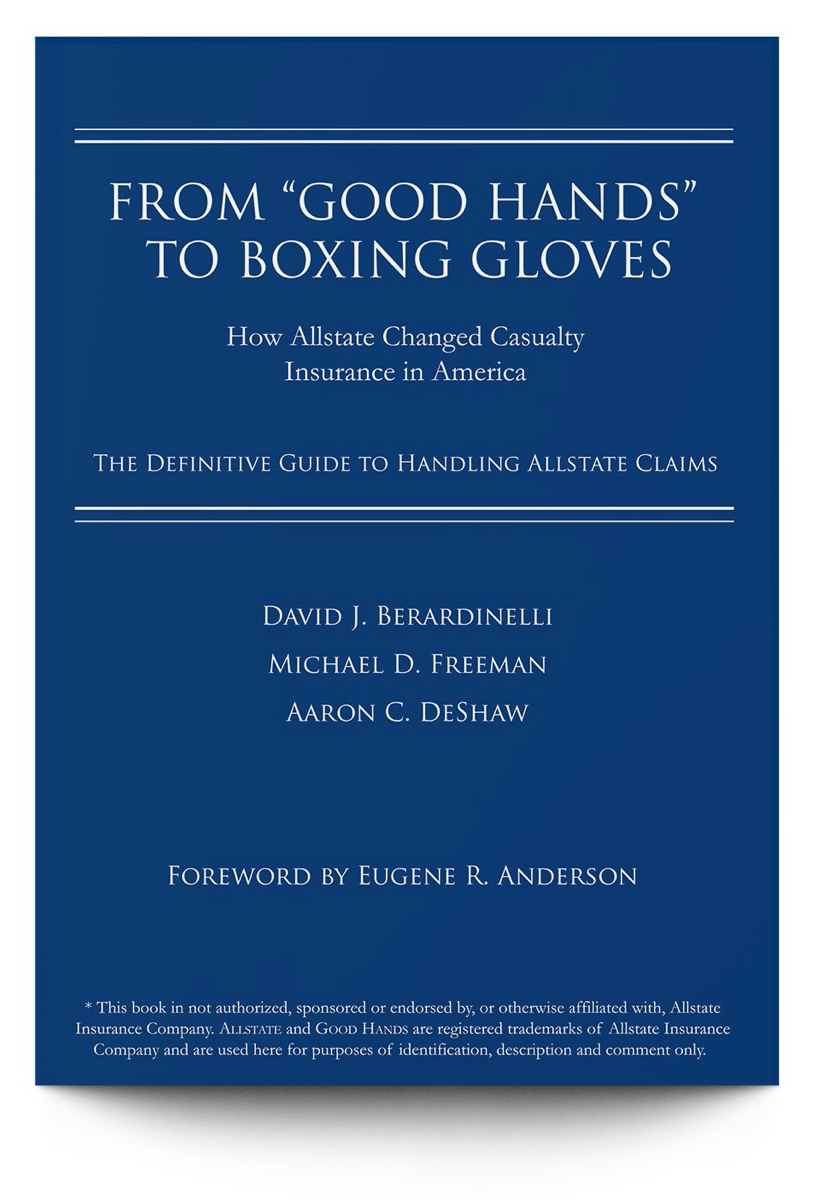Money magazine released a new article today titled "Hardball with homeowners" by Walter Updegrave and Kate Ashford on the topic of improper claim delays and denials. Addressing the impact of improper claim denials and delays in hurricane claims and the use of the Xactimate program (analogous to the Colossus program for bodily injury claims), the authors cite the Trial Guides book From Good Hands to Boxing Gloves and its primary author David Berardinelli.
The claim featured in the article deals with a claim made against Universal Property & Casualty, in which the policyholder's house was extensively damaged by a hurricane.
"But it took four months, plus numerous follow-up calls and faxes with 'Please Help Us' in 36-point type, to get an initial estimate. Meanwhile, mold spread through the house, and Still, his eight-year-old son, his five-year-old daughter and his wife Stacy, 34, then pregnant with their third child, had to move out.
The insurer's first offer came in at $64,000, later upped to $94,000 - far less than the $175,000 in estimates Still had gotten for fixing the roof, replacing drywall and installing new floors." "15 months after the storm, Still and his family (including his new baby boy) are still living with his parents. I believe 100 percent that they're purposely lowballing my claim," says Still. "They figure you have to take their offer because you need to move on."
The article goes on to quote Trial Guides author David Berardinelli:
"But it sounds right to Santa Fe plaintiffs attorney David Berardinelli. Berardinelli is the author of From Good Hands to Boxing Gloves, a book based on some 12,500 PowerPoint slides that fell into his hands during a lawsuit against Allstate Insurance Co.
The slides had been presented to Allstate between 1992 and 1997 by management consultant McKinsey & Co. as part of an overhaul (the Claim Core Process Redesign) of the insurer's claims handling process. Much of the presentation encourages Allstate to adopt a hard-nosed approach to claims.
One typical slide picked from the book refers to taking a stricter stance on settlements: 'Stand firm on final offer with no real negotiation.'
Another - and the inspiration for the book's title - distinguishes between the treatment to be accorded to customers who hire a lawyer to press for a higher payout and those who don't: The unrepresented get the 'good hands' approach (settlements within 200 days or so); the lawyered get 'boxing gloves' (resolution that could take three years or longer).
Think of it as the Oliver Twist strategy: Accept the company's initial offer (which may seem more fair to Allstate than it seems to you ) and you'll get your money quickly. Ask for more and you may be in for a battle.
And while the slides specifically deal with Allstate's auto division, Berardinelli and others familiar with the project contend the concept was applied to homeowners as well.
The strategy outlined in the slides sounds much like the marching orders Shannon Brady Kmatz says she got when she was an Allstate claims adjuster. Kmatz, who left Allstate in 2000, says she felt under constant pressure to 'fast-track' claims - that is, settle quickly for as little as possible.
'We called it throwing them a bone,' she said. 'You offer $500 and hope they go away.'
She said she was also evaluated on how successful she was at convincing people to accept the company's offer rather than try to get more money by hiring an attorney. Adjusters who excelled at these goals, Kmatz says, were rewarded with free dinners and bonuses that could add up to a few thousand dollars a year.
Kmatz provided evidence of such bonuses in a 2003 affidavit that is part of a class-action suit Berardinelli has filed against Allstate, and Money Magazine has reviewed those documents.
Allstate wasn't the only insurer to ask management consultants to help revamp claims processing, say several former claims adjusters. McKinsey helped State Farm with the program known as ACE, or Advancing Claims Excellence, and Accenture advised Farmers Insurance, which had a claims program called ACME, short for Achieving Claims Management Excellence. (McKinsey and Accenture would not comment on their role, citing confidentiality.)"
The article goes on to briefly discuss the use of Xactimate, a program that has faced significant scrutiny in the past for the under-valuation of homeowner claims.
"The program most widely used in homeowners coverage, called Xactimate, comes preloaded with typical repair and replacement prices for more than 15,000 items, broken down by zip code. Thus armed, an adjuster can walk through a house, plug in information such as the number of windows that must be installed and the area of carpeting to be replaced and quickly deliver an impressively precise itemized assessment of what it will all cost.
The adjuster might not mention, however, that it's possible to override the prices in Xactimate. An insurer might instead insert fees charged by 'preferred' vendors who agree to work at discounted rates to get regular referrals from insurers."
The article concludes with an important discussion of homeowners insurance coverage;
"If you have replacement-cost coverage on your house - and you should - be alert to another potential pitfall. (Replacement cost is a type of policy that promises you'll be paid the full amount needed to repair or replace your damaged property.)
Most companies initially reimburse you only for the 'actual cash value' of your loss, or replacement cost minus depreciation. To get the additional benefit, you have to provide receipts showing how much you actually paid.
If you can't pay up front, you may be out of luck, says Steve Strzelec, a Seattle claims consultant. Meanwhile, many policyholders who do pay out of pocket never get the extra money to cover their replacement costs because they don't know they're entitled to it."

